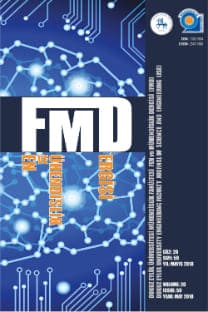Anlamlı ve Benzer Olmayan Türkçe Metinler Üretmek için N-Gram Yöntemi ile İstatistiksel ve Kural Tabanlı Yaklaşımın Birlikte Kullanımı
Doğal dil işleme, Doğal dil üretme, Metin işleme, Metin üretme, İstatistiksel dil modelleme
Combining Statistical and Rule-Based Approach with N-Gram Method to Generate Meaningful and Dissimilar Turkish Texts
Natural language processing, Natural language generating, Text processing, Text generation, Statistical language modeling,
___
- [1] Akalın, Ş.H. 2007. Türk Dünyasında Bilgisayar Destekli Dil Bilimi Çalışmaları ve Türk Dil Kurumu. 38. Uluslararası Asya ve Kuzey Afrika Çalışmaları Kongresi (ICANAS), 10-15 Eylül, Ankara, 17-22.
- [2] Oflazer, K. ve Bozşahin, H.C. 2006. Türkçe Doğal Dil İşleme. Çukurova Üniversitesi Türkoloji Araştırmaları Merkezi.
- [3] Korkmaz, T. 1996. Turkish Text Generation with Systemic-Functional Grammar. Master's Thesis, Bilkent University, Department of Computer Engineering and Information Science, Ankara.
- [4] Gündoğdu, Ö.E. ve Duru, N. 2016. Türkçe Metin Özetlemede Kullanılan Yöntemler. 18. Akademik Bilişim Konferansı, Adnan Menderes Üniversitesi, 30 Ocak-5 Şubat, Aydın.
- [5] Kazkılınç, S. 2013. Türkçe Metinlerin Etiketlenmesi. Yüksek Lisans Tezi, İstanbul Teknik Üniversitesi, Fen Bilimleri Enstitüsü, İstanbul.
- [6] Mocan, Z. 2005. Metin İşleme:Soru Soran Bir Sistem Tasarımı. Yüksek Lisans Tezi, İstanbul Teknik Üniversitesi, Fen Bilimleri Enstitüsü, İstanbul.
- [7] Bilgin, M. ve Amasyalı, M.F. 2017. Dependency parsing with stacked conditional random fields for Turkish. Journal of the Faculty of Engineering and Architecture of Gazi University, 32(2), 385-392.
- [8] Adalı, Ş. ve Erenler, Y. 2003. Türkçe için Okuma Fonksiyonlu Otomatik Metin Oluşturma Sistemi. Elektrik-Elektronik-Bilgisayar Mühendisliği 10. Ulusal Kongresi, İstanbul Sayfa:484-487.
- [9] Özdemir, C.B. ve Amasyalı, M.F. 2010. Hayat Bilgisi Veritabanı Kullanılarak Otomatik Cümle Üretimi. XV. Türkiye'de İnternet Konferansı, 2-4 Aralık, İstanbul, cilt.1 s.1-4.
- [10] Metin, Senem Kumova, and Bahar Karaoğlan. 2010. Collocation extraction in Turkish texts using statistical methods. International Conference on Natural Language Processing. Springer, Berlin, Heidelberg.
- [11] Brown, P.F. et al. 1990. Class-Based N-Gram Models of Natural Language. In Proceedings of the IBM Natural Language ITL, Paris, pp. 283–298.
- [12] Mairesse, F. et al. 2010. Phrase-based Statistical Language Generation using Graphical Models and Active Learning. In Proceedings of the 48th Annual Meeting of the Association for Computational Linguistics (ACL), Uppsala.
- [13] Uchimoto, K. et al. 2002. Text Generation from Keywords. COLING '02 Proceedings of the 19th International Conference on Computational Linguistics, Taipei.
- [14] Tan, J. et al. 2017. From neural sentence summarization to headline generation: a coarse-to-fine approach. 26th International Joint Conference on Artificial Intelligence (IJCAI-17), 19-25 August, Melbourne-Australia, p.4109-4115.
- [15] Bauer, A. et al. 2015. Rule-based Approach to Text Generation in Natural Language-Automated Text Markup Language. (ATML3), Challenge+ DC@ RuleML.
- [16] Kutlugün, Mehmet Ali, and Şirin, Yahya. 2018. Turkish meaningful text generation with class based n-gram model. 26th Signal Processing and Communications Applications Conference (SIU). IEEE. DOI: 10.1109/SIU.2018.8404801.
- [17] Yıldırım, O. ve Atık, F. 2013. Kişisel Gazete, Bitirme Projesi. Yıldız Teknik Üniversitesi, Elektrik-Elektronik Fakültesi, İstanbul.
- [18] Erdogan, H. 2001. Speech Recognition for a Travel Reservation System. International Conference on Artificial Intelligence (IC-AI'2001), 25-28 Jun, Las Vegas-Nevada.
- [19] Manning, C.D. and Schütze, H. 1999. Foundations of Statistical Natural Language Processing. The MIT Press.
- [20] Justeson, J.S. and Katz, S.M. 1995. Principled Disambiguation: Discriminating Adjective Senses with Modified Nouns. Computational Linguistics.
- [21] Eryiğit, Gülşen, Joakim Nivre, and Kemal Oflazer. 2006. The incremental use of morphological information and lexicalization in data-driven dependency parsing. International Conference on Computer Processing of Oriental Languages. Springer, Berlin, Heidelberg.
- ISSN: 1302-9304
- Yayın Aralığı: 3
- Başlangıç: 1999
- Yayıncı: Dokuz Eylül Üniversitesi Mühendislik Fakültesi
Ortak Kısıtlı Rota Kapsama Problemlerinin Çözümü İçin Melez Genetik Algoritma Yaklaşımı
Thermal Performance Investigation of Plain Finned-Tube Evaporators Used in Household Refrigerator
Ömer Alp ATİCİ, Sertaç ÇADIRCI, Tolga APAYDIN
Zamana bağlı potansiyeli olan dikdörtgen bir zarın zorlanmış çapraz titreşimi için bir ters problem
Yarım köprü rezonans tipi evirgeç topolojilerinin değerlendirilmesi
Sevilay Cengiz ŞAHİN, LEVENT ÇAVAŞ
MUHAMMET KARATON, Kağan ÇANAKÇI
Evaluation of Half-Bridge Resonant Inverter Topologies
Yıldıray BAŞKURT, Haldun KARACA
Kademeli Kayar Artımlı Şekillendirme Yöntemi İle Parça Üretiminin Optimizasyonu
